JSFoo 2015 features hands-on training workshops:
- ReactJS by Akshay Gupta and Abhinav Sarkar on 15 September at TERI auditorium
- NodeJS by Shyam Seshadri on 16 September at TERI auditorium
- AngularJS by Shyam Seshadri on 17 September at TERI auditorium.
- NodeBots & JS Hardware by Andrew Fisher on 20th September at Workbench Projects, Ulsoor.
Sign up to receive updates.
If you attended JSFoo 2015, we’d love to hear your feedback.
Sessions
A Slow (and Hopefully Heedful) Ride Through ReactJS and Flux


Abhinav Sarkar & Tejas Dinkar
Abhinav: Old school JVM hacker. Loves log files. Wishes he was programming Haskell.
Tejas: Modern day aesthetically-relevant hacker. Long time Rubyist, recent JavaScript and Clojure programmer.
Objective
ReactJS and Flux as much better front-end engineering battle-axes.
Description
This is an in-depth version of our previous introduction to ReactJS workshop.
We’ll go through the fundamentals and philosophy of ReactJS and see how we can write more modular, testable and maintainable JavaScript interfaces.
We’ll try to cover these high-level ideas:
- Setting up a simple ReactJS application.
- Writing UI components that can be re-used across the application.
- HTML-like templating languages (like JSX, react-templates) that make it much easier for designers to write dynamic interactions by themselves.
- Declarative / logic-less UI components that can perform transitions / animations etc.
- We’ll try our hands on building a few simple UI components. For example, a menu system like this:

- Understanding the Virtual DOM and DOM reconciliation algorithms.
- Server-side rendering for better performance and SEO.
- Using Promises to write better asynchronous components.
- RefluxJS as an implementation of the Flux architecture pattern that simplifies data-flow in heavy JavaScript UIs.
- Testing React components using React.addons.TestUtils and MochaJS.
Requirements
Some prior experience in JavaScript, HTML and CSS should be sufficient as far as the content of the workshop is concerned. It’d be helpful if you’ve played around with React a little bit, deployed a small program and have some idea of what it does. If you’re purely considering this just to see what the fuss is all about, we’ll try our best to have you converted by the end :)
There are a few parts that are a bit heavy on theory that will attempt to give you an idea of the inner workings of React. Most of it otherwise would be practical problems that we’ll solve in real-time and anecdotes from our experiences using it in production.
Do setup your laptop with the lastest Chrome, Sublime Text editor, node, npm and a terminal. If you can setup React on your own, that’d be great; we will guide you through this https://github.com/nilenso/reactjs-workshop15 to help you set it up otherwise.
Links
- September 15, 2015
- 8:30 AM to 5:35 PM
- The Energy and Research Institute (TERI), Bangalore
- Rs. 6000
- Read workshop proposal
NodeJS Workshop

Shyam Seshadri
Head of Engineering at Hopscotch.in
I have been conducting hands-on trainings in AngularJS and NodeJS for over 2 years now, and have conducted over 40 workshops for various companies across the world. And every single one of my clients loves the hands-on nature of the trainings (look at my twitter for some examples).
I have also written two books for AngularJS for O’Reilly, and the latest one is called AngularJS Up and Running. I am an Ex-Googler who was part of the original AngularJS team, and now enjoy spending my time running trainings and workshops.
Objective
This workshop is for JS Developers looking to get a head start in understanding NodeJS and want to learn how to use it for their own projects, as well as Developers who want to be able to quickly develop rest servers for their projects. By the end of this, developers will know how to start writing NodeJS applications, and understand the various bits and pieces of a NodeJS application.
Description
The NodeJS workshop will walk developers through starting their very own NodeJS projects from scratch. As part of the workshop, we will cover:
- What is NodeJS, and how does it work?
- The NPM system and adding modular dependencies
- Understanding Package.json NodeJS’ single threaded architecture and the Event Loop
- Handling Async behavior for rapid processing
- Working with external modules
- Understanding ExpressJS
- Creating configuration driven NodeJS servers
- Working with MongoDB (If time permits)
Developers will work with one application that will be developed from scratch, step by step, during this entire workshop.
Requirements
Requirements for attendees:
- Prior JS experience (2+ years minimum)
- Understanding of Servers and REST API
- Understanding of Asynchronous APIs and calls
- Comfortable with command line
System Requirements:
- NodeJS (v0.12+)
- Git (Not Github, but Git)
- MongoDB (Will try and provide a common one, but just in case)
- WebStorm
- Your own laptops with all these setup
Links
- September 16, 2015
- 9:45 AM to 6 PM
- The Energy and Research Institute (TERI), Bangalore
- Rs. 12000
- Read workshop proposal
AngularJS Workshop

Shyam Seshadri
Head of Engineering at Hopscotch.in
I have been conducting hands-on trainings in AngularJS and NodeJS for over 2 years now, and have conducted over 40 workshops for various companies across the world. And every single one of my clients loves the hands-on nature of the trainings (look at my twitter for some examples).
I have also written two books for AngularJS for O’Reilly, and the latest one is called AngularJS Up and Running. I am an Ex-Googler who was part of the original AngularJS team, and now enjoy spending my time running trainings and workshops.
Objective
AngularJS has been around for quite a few years. Get to learn AngularJS as it was designed, to get the optimal use, and understand how to write AngularJS 2 ready code today. Developers will get a quick overview on the basic core parts of AngularJS, what to use it for, and how to write AngularJS code in such a way that it makes it easy to transfer to AngularJS 2 when it is ready. Also, we will cover what is changing in AngularJS 2, as well as some of the reasons for the same.
Description
The workshop will walk developers very quickly through the basics of AngularJS, cover some of the advanced concepts around Services, Directives, and then jump into AngularJS 2
- AngularJS Controllers
- AngularJS services, when to create them and how to use them
- Understanding routing in AngularJS - UI-Router
- AngularJS directives - Basics and Advanced
- What is changing in AngularJS 2
- Writing code in AngularJS 2 friendly way today
This workshop will again take one end to end example, and build that from scratch along with the attendees so that everyone gets an idea of how AngularJS works within the context of the a larger application framework.
Requirements
Requirements for attendees:
- Prior JS experience (1+ years minimum)
- Understanding of Asynchronous APIs and calls
- Prior experience in AJAX and MVC frameworks highly recommended
- Comfortable with command line
System Requirements:
- NodeJS (v0.12+)
- Git (Not Github, but Git)
- WebStorm (Optional, but recommended!)
- Your own laptops with all these setup
Links
- September 17, 2015
- 8:45 AM to 5:35 PM
- The Energy and Research Institute (TERI), Bangalore
- Rs. 12000
- Read workshop proposal
NodeBots & JS Hardware Workshop

Andrew Fisher
CTO & Head of Data Science for JBA
Andrew Fisher is a member of the core Johnny-Five team, the most used framework for JS + Hardware, and is the creator and lead maintainer of node-pixel, an open source project for controlling LEDs from JavaScript. He is a co-author of the book, “Make: JavaScript Robotics” and has helped organise and run NodeBots workshops for thousands of developers around the region including Australia, China and Sri Lanka. Andrew also helps design hardware for teaching NodeBots workshops.
When not building robots, Andrew is the Chief Technology Officer and Head of Data Science for JBA, an Australian based consultancy focused on customer experience analysis and design.
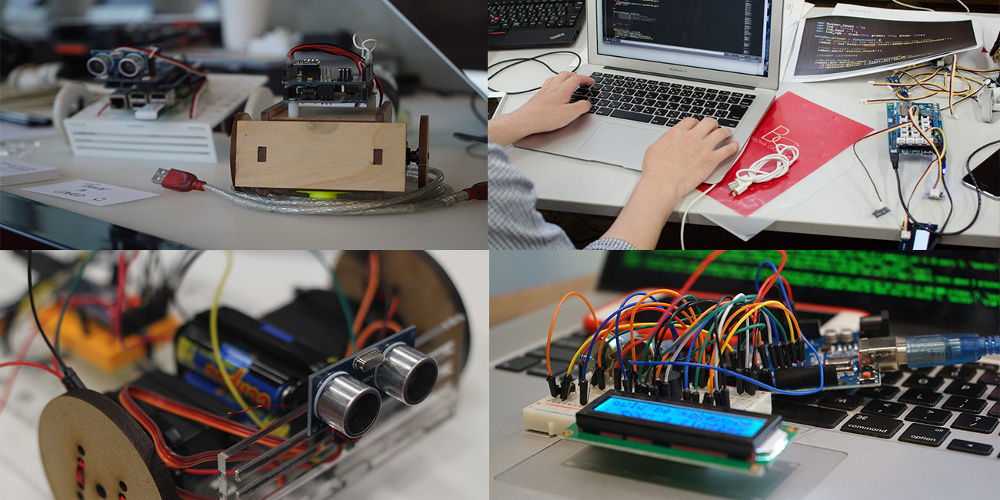
Photos by Andrew Vouliotis, Andrey Sidorov, Patrick Catanzariti
Objective
As the Internet of Things takes off, building devices that can operate in the physical world but can talk to the Web becomes an important part of the skills of the web developer.
This workshop will provide a good foundation for how you can use JavaScript to be able to work with and build physical Internet Connected Things as well as Robots.
Description
As well as being a great web language, JavaScript is well suited to working with the physical world too.
This workshop will be a hands on exploration of NodeBots - a JS framework for building web connected, physical world things - culminating in a BattleBots session at the end of the day.
The session will start with an introduction to the nodebots stack covering how to use javascript to control physical things with examples focussed on some common tasks in order to get everyone up and running as quickly as possible.
From there we will get into small teams of 2-3 people and build a SimpleBot with the aim of competing in a Sumo Battle at the end of the day. SimpleBots are highly configurable and customisable, yet very straightforward wheeled robots designed for teaching. Augmented with some creativity and some code they are also great little battle bots.
The Sumo battle challenge is designed to teach fundamentals of construction (physical and electronics), drive mechanisms and control and real world event handling, as well as being just lots of fun!
Participants will leave having a good knowledge of the JS Hardware stack, how to start working with simple electronics using JavaScript and having designed and built a robot based on requirements.
The hardware components for the workshop will be supplied. Participant Kit includes
- Arduino Nano
- Jumper wires
- Battery holder 4xAA
- Ultrasonic sensor
- Two CR Servos
- Two Breadboards
- USB cable
- Chassis and wheels
- Batteries
- Two Microservos
Requirements
Participants should have an good knowledge of JavaScript and at least familiarity with NodeJS as these will be assumed knowledge. No assumptions are made regarding hardware or electronics knowledge as this will be covered in the session enough to get you going (if you’re an electrical engineer you’re welcome to come too though!).
All participants will need to have a laptop that can run nodejs and arduino on it.
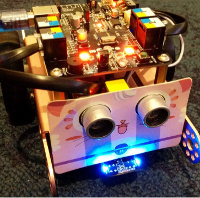
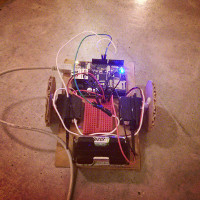
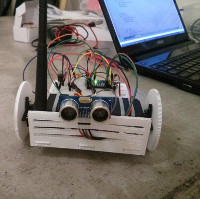
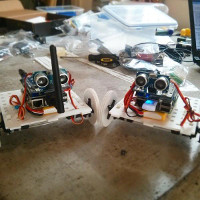
Links
- September 20, 2015
- 10 AM to 6 PM
- WorkBench Projects, Halasuru Metro Station, Bangalore
- Rs. 7500 (includes full hardware kit)
Nodebots workshop tickets for a team(two/three) are also available
- Read workshop proposal
Workshop Schedule
Workshop Venues
The Energy and Research Institute (TERI)
4th Main Rd, Domlur II Stage,
Domlur, Bangalore,
Karnataka 560008, India
TERI
Map
WorkBench Projects
Halasuru Metro Station,
Old Madras Road, Gupta Layout,
Halasuru, Bengaluru 560008,
Karnataka, India
WorkBench Projects